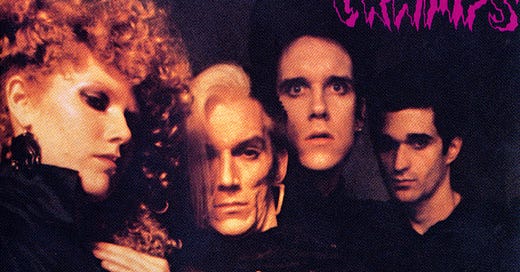Genre of the Day - Psychobilly
Album of the Day - Songs the Lord Taught Us by The Cramps (1980)
As bears, groundhogs, and other creatures of the wild gear up for another hibernation cycle, my peers and I are doing anything but, sleepless in studentville as finals season wallops us. As the fluorescent lights of my school’s most functional library steadily sapped my study group’s energy and humanity, we all remarked that we felt a little crazy. Psychobilly perfectly encapsulates this time—I now thoroughly know the meaning of the phrase ‘at my wit’s end.’ I am at the end of my wits… I am fresh out of them, really. If I produce an article just as drab and gray as the library I’ve found myself at for a good chunk of my time recently, please know I am only a product of my environment. Psychobilly seems the perfect soundtrack to trying to finish a paper at 5 AM.
Psychobilly lobs the energy of punk onto rockabilly, which itself possessed something of a punk ethos for the 1950s. Rockabilly had functioned as a high-octane vision of nascent rock’n’roll that pioneered the use of the electric guitar during a transitional time in American music. Psychobilly mostly works to augment those key beloved musical elements like guitar distortion that defined the rough-around-the-edges appeal of rock’n’roll and gave punk an early foundation to build off of. Punk and rockabilly also form a natural pair in each form’s bold incorporations of fashion and iconography as extramusical meaning.
Where the US has produced much of rock’s essential zeitgeists, the UK has successfully often reinterpreted them with zanier skews. Psychobilly’s emergence was centered in Britain, which evidently contributed a touch of psychosis to an iconic American genre that had so electrified the pioneering UK punk acts. They found fundamental strangeness to mine from the frantic musical energy of rockabilly—its frenzied vocals and its hollow-electric guitar shakes acted as perfect conduits for weird, fantastical themes. Aesthetically, psychobilly extends rockabilly’s rebellious subversion of ‘50s purity with punk’s colorful yet hard-edged free expression.
The Cramps were actually good old Yankees, pioneering the sound of rockabilly slightly before the Brits consolidated it. “TV Set” leads, Lux Interior’s wild-eyed vocal gusto and the march of the drums walking the line (hello Johnny Cash) between the parent genres masterfully—the distorted guitars jut out with punk intensity, but the melodies are endearing to recall the release rockabilly brought to the ‘50s. In Doctor Frankenstein terms, he chronicles the construction of psychobilly in “Garbage Man,” painting his provenance as nuclear mutation: “So one half hillbilly and one half punk / Oh, eight long legs and one big mouth.” The space age jets in on “Mystery Plane” as he bridges an angsty alien narrative to the archetypical rebel without a cause rockabilly lends a voice to. Wild shrieks add live excitement to the more traditionally indebted homage “Tear It Up,” which possesses a ripping vocal performance and crackles with the energy of witnessing that form’s birth; perhaps psychobilly’s freakiest contribution is showing time as a construction, in blurring decades and fusing sounds with its virtuosic, syncretic, rocking approach.






Hi! 😊 Don't know if you might be interested but I love to write about sustainability (fashion, travel and our relationship with clothes). I'm a thrift shopping and vintage clothing lover who likes to explore the impact textile industry and consumistic culture have on the environment and also what people can do to shift the tendency.
• • •
https://from2tothrift.substack.com/